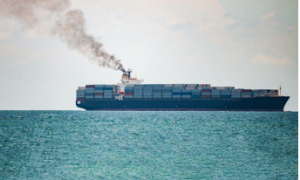
20 OCT 2025
Governments at the International Maritime Organization decided to postpone for one year the adoption of what would have been the world’s first global carbon pricing system on international shipping at the Extraordinary Session of the Marine Environment Protection Committee in London this week. The delay follows pressure and procedural tactics from the United States, Saudi Arabia, and other countries, pushing the adoption vote to October 2026.
The framework, initially agreed in principle in April when 63 countries voted in favor against 16 oil-producing states, aims to bring international shipping emissions down to net zero by 2050. The agreement would have created the first global carbon pricing mechanism for any industrial sector.
Thomas A. Kazakos, Secretary General of the International Chamber of Shipping, expressed the industry’s frustration. “We are disappointed that member states have not been able to agree a way forward at this meeting. Industry needs clarity to be able to make the investments needed to decarbonise the maritime sector, in line with the goals set out in the IMO GHG strategy”.
The postponement drew sharp criticism from environmental organizations. Dr. Alison Shaw, IMO Manager at T&E, said the delay “leaves the shipping sector drifting in uncertainty” but noted that “this week has also shown that there is a clear desire to clean up the shipping industry, even in the face of US bullying”.
Anne H. Steffensen, CEO of Danish Shipping, called the outcome “a major disappointment,” stating: “This is not what we came for. We came here to finally conclude a crucial climate agreement for international shipping”. She added that “geopolitical tensions and a new world order have made their way in – also at the IMO”.
Patrick Verhoeven, managing director of the International Association of Ports and Harbors, described it as “a major setback for the maritime industry,” warning that the delay “will simply open the door for more national and regional measures, which will add to an already complex regulatory patchwork resulting in unintended consequences.”
The World Shipping Council, while acknowledging the challenging negotiations, underlined the importance of using the year ahead to clarify and develop the framework. The liner industry has invested $150 billion in ships designed to run on green fuels and remains committed to net-zero by 2050.
Hon. Ralph Regenvanu, Minister for Climate Change of Vanuatu, expressed particular concern from the perspective of climate-vulnerable nations: “This is unacceptable given the urgency we face in light of accelerating climate change. The IMO’s failure to adopt the framework this week marks a failure of this United Nations agency to act decisively on climate change.”
The Trump Administration threatened retaliatory tariffs and sanctions, especially on developing and climate-vulnerable states, if they supported the framework. Delegates from many developing countries described this pressure as “bullying,” “unprecedented,” and “undiplomatic.”
U.S. Ambassador to the UN Mike Waltz and Secretary of State Marc Rubio both claimed the outcome as a victory, stating that the United States “prevented a massive UN tax hike on American consumers”.
The Net-Zero Framework includes requirements for gradual reduction of greenhouse gas intensity in marine fuels, with ships that emit more than allowed required to pay, while energy-efficient vessels can earn and trade surplus units. The delay could risk the deal not coming into force until 2030, even if adopted in a year.
The motion to delay was put forward by Singapore and called to a vote by Saudi Arabia. Despite the setback, the framework that was agreed in April remains the result of three years of discussions and represents the only global regulation for greenhouse gas reduction measures in shipping.